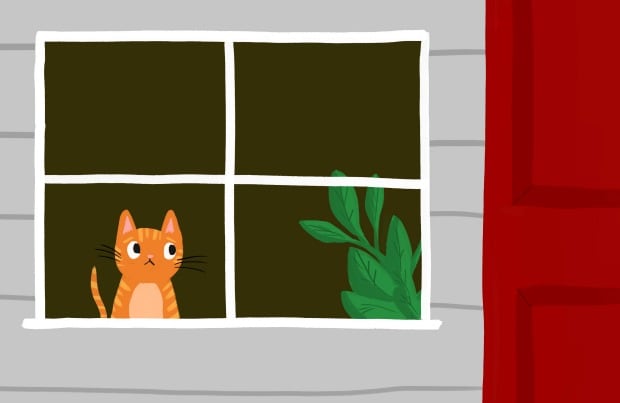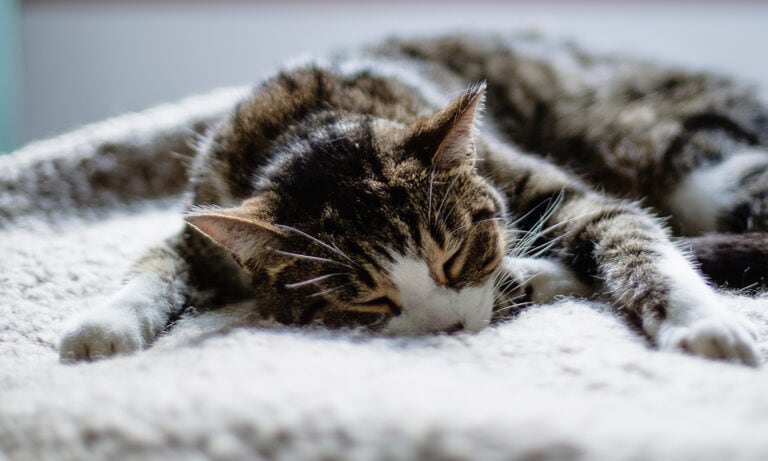Famously independent and often as resourceful as their jungle-prowling relatives, cats are seen as lower-maintenance than dogs, so cat parents may feel more comfortable leaving their pets on their own more often (and with fewer tinges of guilt). The truth, though, is that cats crave social interaction and companionship, despite those clichés about the aloof feline loner.
So, what do cat parents need to know about feline loneliness and how to cope with it?
Cats Do Experience Loneliness
“If cats don’t have the possibility to share spaces, proximity and time with their preferred buddies, they will get lonely,” explains Dr. Carlo Siracusa, director of Animal Behavior Services at Penn Vet’s Ryan Hospital.
He added that kitties tend to become social with domestication, and that their wild feline ancestors were solitary animals, so cats lack the well-developed, more complex social behavior of dogs, whose wolf ancestors are a “pack” species.
“Cats… want to share affection in a ‘feline’ fashion, which is a few rubs and sharing the same couch,” Dr. Siracusa says. “Keeping proximity is in fact the way that cats show affection. Problems arise when people want to interact with cats in human terms — hugging, kissing, and prolonged petting. Many cats find this behavior rude and unacceptable and run away. Cats will let us understand when they want a few strokes.”
Rita Reimers, aka Rita the Cat Analyst, agrees that cats “absolutely get lonely when their humans are away, but they will act out differently than a dog will.”
Signs Your Cat Is Lonely
Long absences can cause cats to have behavioral issues, even if they are just temporary ones, says Reimers.
“A cat left on his own for prolonged periods may use your bed for a litter box, knock things over or tear things up around your home out of boredom, and they may even become reclusive and antisocial,” she says.
When you arrive home to see how your lonely cat has torn the place apart, your reaction is certain to be one of distress that will only add to your kitty’s unhappiness. Unfortunately for us, cats can’t explain how they got so bored that they shredded the new love seat instead of heading to Netflix.
“If cats don’t have the possibility to share spaces, proximity and time with their preferred buddies, they will get lonely.”
Dr. Siracusa says that cats left alone or confined for a prolonged time can get very stressed and anxious.
“They will also get stressed if their environment is under stimulated — when there is not enough playing and interaction. And this may trigger behavior problems such as frustration and aggression,” he notes.
How to Help a Lonely Cat
Reimers — who advises cat parents on a range of feline behavioral issues — offers a number of other ways to help combat feline loneliness.
“When your cat is alone for prolonged periods of time, be sure to provide a cat-friendly environment with cat trees by the windows and plenty of self-play type of toys,” she says.
A cat tree, like Frisco’s 52-inch cat tree, gives your cat a great way to get some exercise, thus burning off some energy and stress, and a window brings a view of passing birds, squirrels and pedestrians. Self-play cat toys will give your cat a fun outlet for creativity and enjoyable activity — and will prevent him from checking out your own belongings as potential playthings that may be kitty-hazardous or just plain off-limits.
Reimers also recommends playing the TV or radio for your cat, thus creating the reassuring sound of music or human voices. In addition, when you leave your cat on his own, “put a shirt or something else you’ve worn but not washed on your bed, so your cat and smell your scent,” Reimers says. Cats get a sense of reassurance and comfort from the presence of your particular scent on the fabric, which can feel extra-welcoming on the bed.
If you’re away from home a lot, it’s likely that you use a pet sitter to care for your cat.
“Hire one who will do more than feed, scoop the litter box and dash out the door,” Reimers says.
Cats need attention and playtime for stress relief, so the ideal pet sitter will have genuine concern about how your kitty is faring and will spend plenty of time giving her reassurance and affection, as well as checking around your home to be sure the cat hasn’t accidentally gotten into mischief. A savvy pet sitter might even play an audio recording of your voice so your cat can hear that familiar sound, and perhaps realize that you’ll be home soon.
Both experts agree that one idea is to get another kitty buddy so that your feline is not alone.
“Some cats do well with other cats and if you want to maximize the chances that they will get along, adopt two kittens from the same litter, or two cats of similar ages,” Siracusa suggests.
But that isn’t always an automatic fix.
Dr. Siracusa emphasizes that the possibility of loneliness among multiple cats left on their own “depends on the relationship they have with humans. If they have a person with whom they’re very attached, cats can get lonely in his or her absence even if they live with other cats.”
Of course at the end of the day, what your lonely cat really wants is you. If you merely leave food, water and litter while you are always on the go, devoting a few minutes here and there to your pet, perhaps you need to rethink having a cat at all. But if you thoughtfully create an environment rich with stimulation and offer lots of one-on-one time when you are at home, you can diminish the pangs of loneliness and feel a deeper appreciation for your feline buddy’s devotion to you.
Kathy Blumenstock is owned by cats, loved by dogs, writes about both, and still longs for a horse.
Feature Image: Illustration by Nan Lawson
Share:









